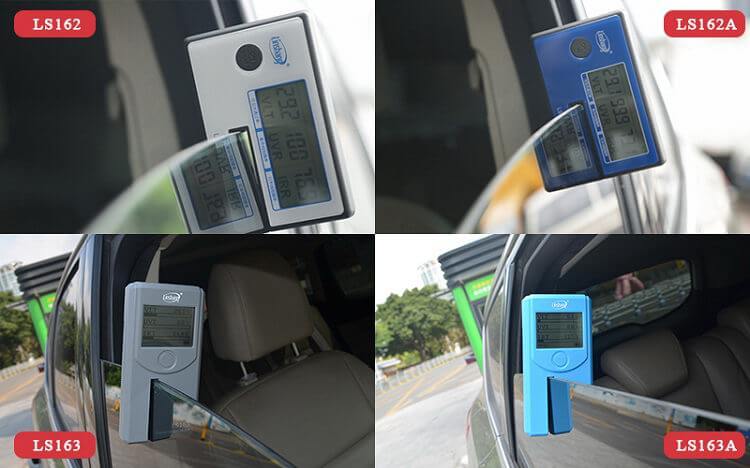How to Choose the Right Model Among Linshang Window Tint Measurement Device?
Linshang Technology has four portable window tint measurement devices that can be directly used to detect the windshield of the car. These four window tint checkers are LS162, LS162A, LS163 and LS163A. Compared with other solar transmission meters, the main advantage of these four instruments is that they can measure the car's thermal insulation film or directly test the car's windshield after sticking film. The Linshang window tint measurement devices are small and easy to carry.
Portable Car Window Tint Measurement Devices
Many customers are very confused when facing a large number of models, so this article will focus on the similarities and differences of these four instruments to help users choose the appropriate model among these four portable window tint measurement devices.
1. Table of four window tint measurement devices parameters
| Model | LS162 | LS162A | LS163 | LS163A |
| Price | $68 | $90 | $88 | $108 |
Infrared light |
940nm | 1400nm | 940nm | 1400nm |
Visible light |
380-760nm light source,conform to the CIE photopic luminosity function |
|||
| UV light source | 365nm | |||
| Light path | point light source | parallel light path | ||
| Notch size | 8mm | 6mm | ||
| Test data |
1. Transmittance 2. UV rejection rate 3. IR rejection rate |
1. Transmittance 2. UV transmittance and rejection rate 3. IR transmittance and rejection rate |
||
2. Differences between Linshang window tint measurement devices
(1) Difference between LS162 series and LS163 series.
LS162 and LS162A window tint measurement device use point light source design, while LS163 and LS163A use parallel light path design. When testing thicker glass, the data accuracy of LS163 series window film transmission meter is higher.
The LS162 series has only one measurement mode. The instrument can display the transmittance, infrared and ultraviolet rejection rates at the same time. The LS163 series has three measurement modes to choose from. The mode 1 is the same as the LS162 series. The mode 2 can display full transmittance. Mode 3 can display only light transmittance.

The display interface of LS163A window tint measurement device can be rotated 360 ° adaptively, which is more convenient when reading.
(2) The difference between 940nm and 1400nm infrared light source
Both LS162 and LS163 use 940nm infrared light source, while LS162A and LS163A use 1400nm infrared light source.
Each film will have infrared rejection rate data at 940nm and 1400nm. Due to different production processes, the thermal insulation rate of some films at 940nm will be greater than the thermal insulation rate of 1400nm. Some films will have a higher thermal insulation rate at 1400nm.
In general, when measuring endothermic films, the infrared rejection rate at 940nm will be relatively high; when measuring metal and ceramic films, the infrared rejection rate will be higher at 1400nm. However, because there are many types of films, the difference between the heat insulation data of the same film at 940nm and 1400nm is also different. Therefore, when some films are measured with different infrared light sources, the data difference is small and some will show 30 -40% difference.
- Choosing the Right Window Tinting Film
- Window Tint Meter | Pros and Selection Methods of Architectural Membrane
- Advantages of LS110H and LS110A Split Transmission Meter
- Best Choice:LS182 Solar Film Transmission Meter
- Solar Power Lightens Up with Thin-Film Technology
- What is the Solar Heat Gain Coefficient Ratings (SHGC)
